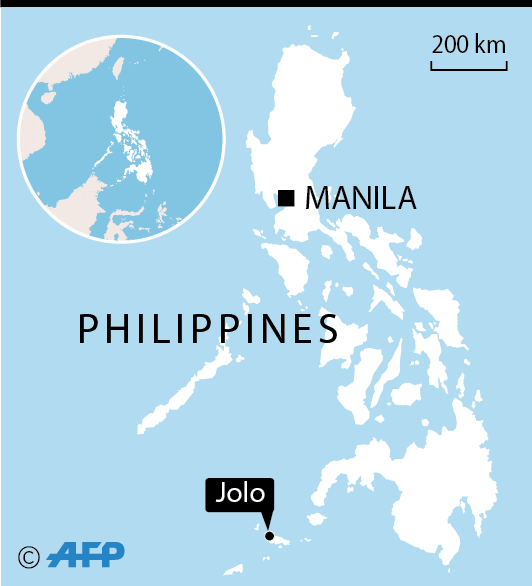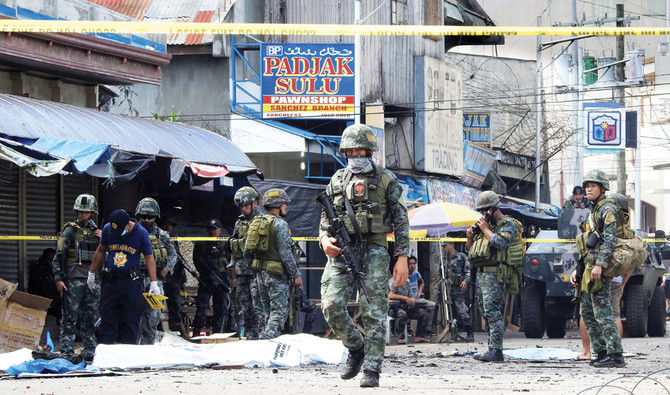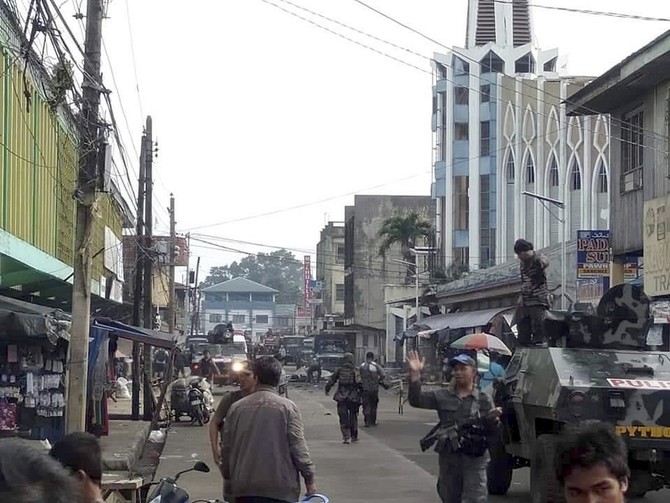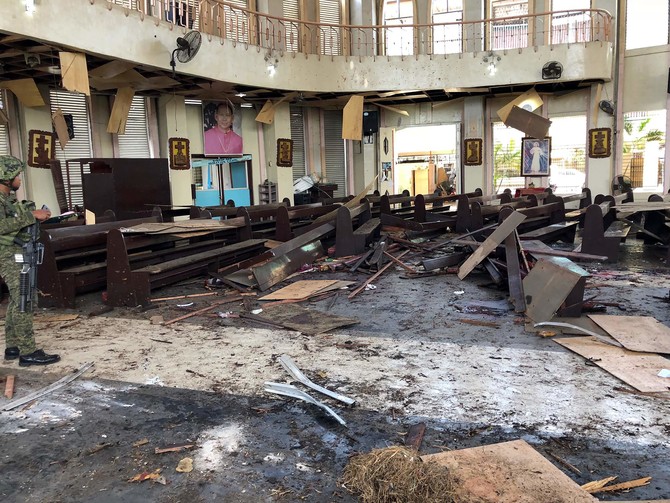MANILA: Daesh militants claimed responsibility for a twin bomb attack that killed at least 20 people and injured 111 others in a Roman Catholic cathedral in the southern Philippines on Sunday.
The international terrorist group issued a formal communique saying two suicide bombers had detonated explosive belts, according to the SITE Intelligence Group which monitors jihadist activities.
But a Philippine military report said the second bomb was left in the utility box of a motorcycle in the parking area outside the church.
The first explosion went off inside the cathedral on Jolo island, in Sulu province, and was followed by a second blast outside, that was detonated as security forces raced to the scene, officials said.
Civilians bore the brunt of the attack, which also killed seven soldiers. Sixty-one civilians were among those wounded.
Condemnations
Saudi Arabia, the Organization of Islamic Cooperation (OIC), the Vatican and others condemned the attack and extended their sympathies to the families of the victims.
Pope Francis, who is visiting Panama, expressed his “firm condemnation of this act of violence that causes more mourning in the Christian community. I pray for the dead and the injured.”
The first of the two bombs, placed inside the Cathedral of Our Lady of Carmel on the southern island of Jolo, detonated during Sunday Mass.
The bloodshed came less than a week after voters’ decisive approval of giving Muslims in the south more control over their own affairs, which sparked hopes of quelling long-time separatist violence.
“Just because the referendum has passed does not mean that things are going to get better overnight,” said Gregory Wyatt, director for business intelligence at PSA Philippines Consultancy.
“There are still militant groups that will continue to be active and pose a security threat.”
National security adviser Hermogenes Esperon said that “extremist criminals” plotted the bombings.
“We will not allow them to spoil the preference of the people for peace,” Esperon said. “Peace must prevail over war.”
Defense Secretary Delfin Lorenzana called the attack a “dastardly act” and urged the local population to cooperate and “deny terrorism any victory.”

Retribution
The attack was one of the deadliest in recent years in a region long plagued by instability. It came amid hope and excitement about the ratification of a devolution plan that aims to bring development, jobs and peace to one of Asia’s poorest and most volatile places.
Manila swiftly vowed to hunt down the attackers.
“The enemies of the state have boldly challenged the capability of the government to secure the safety of the citizenry in that region,” said Salvador Panelo, spokesman of Philippine President Rodrigo Duterte.
“We will pursue to the ends of the earth the ruthless perpetrators behind this dastardly crime. The law will give them no mercy,” he said.
National police chief Oscar Albayalde, speaking on DZMM radio, suggested the Abu Sayyaf group was the prime suspect.
“They want to show force and sow chaos,” he said. The Abu Sayyaf has pledged allegiance to Daesh and is notorious for its bombings and brutality.
Jolo is a stronghold of the Abu Sayyaf, which runs a lucrative piracy and kidnapping operation that successive governments have failed to break up. The group, which operates in the waters and islands of western Mindanao, has beheaded numerous foreign captives when ransom payments were not met.
Pictures distributed by the military of the inside of the Jolo church showed several rows of wooden pews destroyed, with debris strewn across a blackened floor. Humvees and army trucks were lined up on the road outside.
The attack followed Friday’s announcement that the region, a mainly Muslim part of the predominantly Catholic Philippines, had ratified the creation of an autonomous area called Bangsamoro, with 85 percent of voters behind it.
Although Sulu was among only a few areas that rejected autonomy, it will still be part of the new entity when it is fully formed in 2022.
The referendum came amid concerns about the presence of extremists in the Philippines and the possibility that foreign radicals will join those of Indonesia and Malaysia in gravitating to Mindanao to capitalize on porous borders, jungles and mountains, and an abundance of arms.
The Philippine military in mid-2017 encountered its biggest and longest battle since World War Two when an alliance of extremists loyal to Daesh, among them foreigners and children, overran Marawi City and tried to establish a caliphate.


















